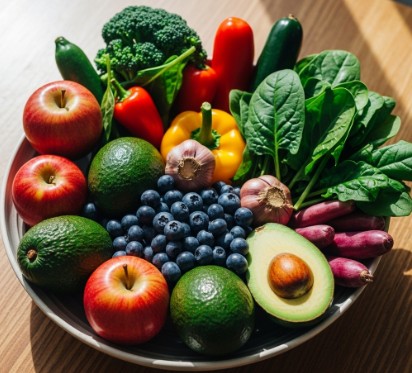
Our bodies need a hormone called insulin to turn sugar from the food we eat into energy. But sometimes, our body’s cells don’t respond well to insulin. This is called “insulin resistance,” and it can lead to high blood sugar levels and, over time, even type 2 diabetes. The good news is that certain fruits and vegetables can help your cells become more sensitive to insulin, making it easier for your body to control blood sugar.
Let’s explore some delicious and healthy options!
1. Leafy Green Powerhouses (Like Spinach, Kale, and Swiss Chard)
How they boost insulin sensitivity: These green leafy vegetables are full of magnesium. Magnesium is super important for how your body uses insulin and processes sugar. When you have enough magnesium, your cells are better at “listening” to insulin. They also have good amounts of antioxidants and fiber, which are great for managing blood sugar.
How they help regulate blood sugar: The fiber in leafy greens slows down how quickly sugar is absorbed into your blood. This stops big jumps in blood sugar. Because they’re rich in magnesium, they directly help improve how insulin works, making your body better at lowering blood sugar after you eat.
2. Berries (Such as Blueberries, Raspberries, and Strawberries)
How they boost insulin sensitivity: Berries are rich in special compounds called anthocyanins, which are strong antioxidants that give them their bright colors. Studies suggest that these anthocyanins can make your cells more sensitive to insulin and help them take in sugar more easily. They also contain a good amount of fiber.
How they help regulate blood sugar: The fiber in berries helps to slow down the release of sugar into your bloodstream. The antioxidants fight inflammation in your body, which can make insulin resistance worse. By reducing inflammation, berries help your body handle blood sugar better.
3. Avocados
How they boost insulin sensitivity: Avocados are packed with healthy monounsaturated fats. These fats have been shown to improve how well your body responds to insulin and can also lower inflammation. Plus, they contain fiber and potassium.
How they help regulate blood sugar: The healthy fats in avocados don’t cause your blood sugar to spike. They also help you feel full, which can help you eat less overall and manage your weight – and keeping a healthy weight is key to improving insulin sensitivity. The fiber also helps in keeping blood sugar levels steady.
4. Broccoli and Other “Crunchy” Vegetables (Like Cauliflower and Brussels Sprouts)
How they boost insulin sensitivity: These vegetables contain unique substances like sulforaphane. Sulforaphane has anti-inflammatory effects and can help improve how insulin signals to your cells. They are also good sources of fiber and antioxidants.
How they help regulate blood sugar: The fiber in these vegetables slows down digestion, which means sugar enters your blood more slowly and steadily. The special compounds in them may also help protect your cells from damage and make them more responsive to insulin.
5. Apples
How they boost insulin sensitivity: Apples are a fantastic source of soluble fiber, especially a type called pectin, and lots of antioxidants. Pectin can help improve how sensitive your body is to insulin and slow down how fast sugar is absorbed.
How they help regulate blood sugar: The high fiber content in apples helps to keep blood sugar levels stable by preventing sudden, sharp increases. The antioxidants also contribute to your overall body health, which supports better insulin function.
6. Sweet Potatoes
How they boost insulin sensitivity: Unlike regular white potatoes, sweet potatoes have a lower glycemic index (meaning they raise blood sugar more slowly) and are full of fiber, vitamins, and minerals like magnesium. Their complex carbohydrates are digested slowly.
How they help regulate blood sugar: The fiber in sweet potatoes helps to slow down the absorption of sugar, leading to a much steadier rise in blood sugar. They give your body a steady release of energy without causing big ups and downs in your blood sugar.
7. Cinnamon (A Spice, But a Great Partner for Fruits and Veggies!)
How it boosts insulin sensitivity: While not a fruit or vegetable, cinnamon contains compounds that can act a bit like insulin and help your cells take in sugar more easily. It also improves the way insulin signals to your cells.
How it helps regulate blood sugar: Cinnamon can help lower blood sugar levels by making your body more sensitive to insulin and by slowing down how fast carbohydrates are broken down in your gut. A little sprinkle on your fruits or oatmeal can be very helpful.
Eat a Rainbow of Foods!
Adding a mix of these wonderful fruits and vegetables to your daily meals is a simple yet powerful way to improve your insulin sensitivity and better manage your blood sugar. Always remember that eating a balanced diet, getting regular exercise, and keeping a healthy weight are all very important for good health. If you have any health concerns, especially if you have existing conditions, it’s always best to talk to your doctor or a dietitian for personal advice.